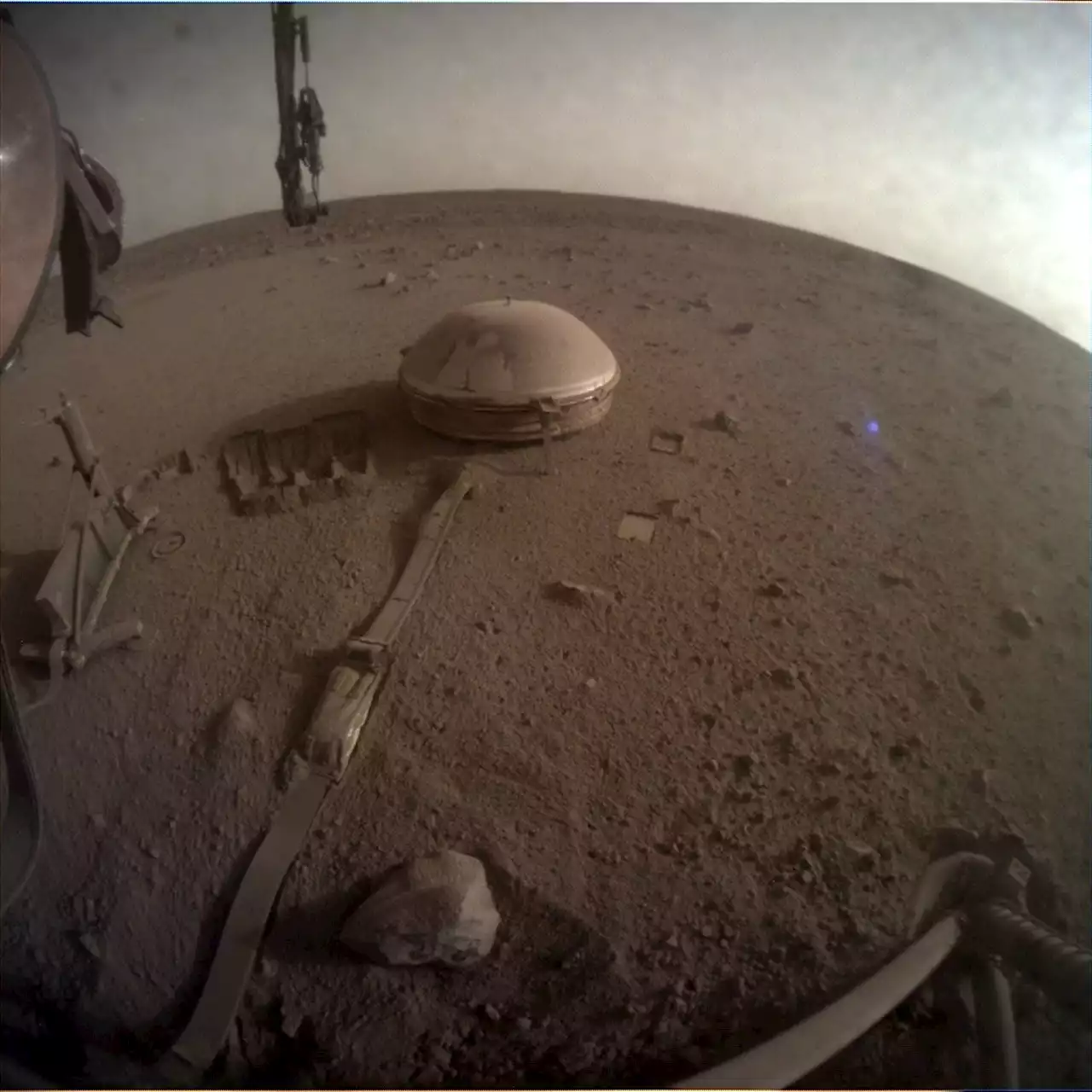The Mars InSight probe is nearing its end. Here's what it discovered
that came from Mars Monday morning actually didn’t originate from anywhere near there. It came from NASA’s Jet Propulsion Laboratory in Pasadena, Calif., where the mission of the Mars InSight lander is managed. Still, the message was a poignant one.
InSight was built to do more than study Mars alone; it was designed to provide new clues to planetary evolution as a whole. Earth, which has active plate tectonics, is forever erasing and re-erasing its internal history. Look deeply into our planet and you’ll have little clue as to just what its geologic anatomy was in its first billion or two billion years.
One magnitude 4 quake recorded last year was caused by a meteorite hit. To study that one, InSight worked together with NASA’s Mars Reconnaissance Orbiter circling the planet overhead. That ship captured images of the site of the impact, revealing that the meteorite had exposed a layer of water ice lying just beneath the surface—showing that Mars may be a wetter world than it is commonly thought to be.
While Mars lost its magnetic field about four billion years ago when its core cooled sufficiently that it stopped spinning relative to the layers above it, InSight found what NASA terms “ghosts” of that magnetism preserved in rocks ranging from 61 m to several miles below ground. The intensity of the magnetism turned out to be 10 times greater than orbiting spacecraft had measured, suggesting that the now-vanished magnetic field may have been stronger than once believed.
Belgique Dernières Nouvelles, Belgique Actualités
Similar News:Vous pouvez également lire des articles d'actualité similaires à celui-ci que nous avons collectés auprès d'autres sources d'information.
 NASA’s Mars InSight posts its (probably) final TweetAll those expensive gadgets the boffins attached to it, they couldn't afford a feather duster?
NASA’s Mars InSight posts its (probably) final TweetAll those expensive gadgets the boffins attached to it, they couldn't afford a feather duster?
Lire la suite »
 Perseverance: Nasa Mars rover to lay down rocks for Earth returnThe Perseverance rover is set to make a store of rocks that can be brought home by a future mission.
Perseverance: Nasa Mars rover to lay down rocks for Earth returnThe Perseverance rover is set to make a store of rocks that can be brought home by a future mission.
Lire la suite »
 Rock Sled Suspension is Developing a Long-Travel Leading Linkage ForkAshley Kalym, Founder of Rock Sled Suspension, gives us some insight into the what, how, and why of the long-travel fork he has been developing…
Rock Sled Suspension is Developing a Long-Travel Leading Linkage ForkAshley Kalym, Founder of Rock Sled Suspension, gives us some insight into the what, how, and why of the long-travel fork he has been developing…
Lire la suite »
 Stacey Solomon begs fans not to judge as she shows off rare messy kitchenLoose Women presenter Stacey Solomon gave fans an insight into the realities of her kitchen after days of Hanukah celebrations and muddy dog walks causes a huge mess
Stacey Solomon begs fans not to judge as she shows off rare messy kitchenLoose Women presenter Stacey Solomon gave fans an insight into the realities of her kitchen after days of Hanukah celebrations and muddy dog walks causes a huge mess
Lire la suite »
 Frontiers | Loss of perceived social role, an index of social frailty, is an independent predictor of future adverse events in hospitalized patients with heart failureAims Although the impact of physical frailty on prognosis and the effect of cardiac rehabilitation in HF patients has been well established, data for the prognostic impact of social frailty (SF) in HF patients are limited. In addition, the relative importance of each SF domain in clinical outcomes remains unclear. We aimed to get a new insight into the associations of SF with clinical outcomes in elderly hospitalized HF patients. Methods A single-center, retrospective cohort study was conducted using data from 310 in-hospital HF patients aged ≥ 65 years (mean age of 78 ± 8 years; 49% women). Makizako’s five questions, a self-reported questionnaire, were used to define SF. The primary outcome was composite events defined by all-cause death and cardiovascular events. Results Of the 310 elderly HF patients, 189 patients (61%) had SF. Seventy-five patients (24%) had composite events during a mean follow-up period of 1.93 ± 0.91 years. Kaplan-Meier curves showed that patients with SF had a significantly higher composite event rate than patients without SF. In multivariate Cox regression analyses, SF was independently associated with a higher composite event rate after adjusting for prognostic markers [adjusted hazard ratio (HR), 2.01; 95% confidence interval (CI), 1.07 to 3.78; p=0.04]. Of the 5 questions for defining SF, an answer of yes to the question about not feeling helpful toward friends or family, which indicates loss of perceived social role, was an independent predictor of composite events (adjusted HR, 2.28; 95% CI, 1.36 to 3.82; p | 0.01). Inclusion of loss of perceived social role into the baseline prognostic model improved both the continuous net reclassification improvement (0.562; 95% CI, 0.298 to 0.827; p | 0.01) and integrated discrimination improvement (0.031; 95% CI, 0.006 to 0.056; p=0.02). Conclusion Loss of perceived social role is associated with increased adverse event risk and provides additive prognostic information in elderly HF patients.
Frontiers | Loss of perceived social role, an index of social frailty, is an independent predictor of future adverse events in hospitalized patients with heart failureAims Although the impact of physical frailty on prognosis and the effect of cardiac rehabilitation in HF patients has been well established, data for the prognostic impact of social frailty (SF) in HF patients are limited. In addition, the relative importance of each SF domain in clinical outcomes remains unclear. We aimed to get a new insight into the associations of SF with clinical outcomes in elderly hospitalized HF patients. Methods A single-center, retrospective cohort study was conducted using data from 310 in-hospital HF patients aged ≥ 65 years (mean age of 78 ± 8 years; 49% women). Makizako’s five questions, a self-reported questionnaire, were used to define SF. The primary outcome was composite events defined by all-cause death and cardiovascular events. Results Of the 310 elderly HF patients, 189 patients (61%) had SF. Seventy-five patients (24%) had composite events during a mean follow-up period of 1.93 ± 0.91 years. Kaplan-Meier curves showed that patients with SF had a significantly higher composite event rate than patients without SF. In multivariate Cox regression analyses, SF was independently associated with a higher composite event rate after adjusting for prognostic markers [adjusted hazard ratio (HR), 2.01; 95% confidence interval (CI), 1.07 to 3.78; p=0.04]. Of the 5 questions for defining SF, an answer of yes to the question about not feeling helpful toward friends or family, which indicates loss of perceived social role, was an independent predictor of composite events (adjusted HR, 2.28; 95% CI, 1.36 to 3.82; p | 0.01). Inclusion of loss of perceived social role into the baseline prognostic model improved both the continuous net reclassification improvement (0.562; 95% CI, 0.298 to 0.827; p | 0.01) and integrated discrimination improvement (0.031; 95% CI, 0.006 to 0.056; p=0.02). Conclusion Loss of perceived social role is associated with increased adverse event risk and provides additive prognostic information in elderly HF patients.
Lire la suite »
 Identity construction in the very old: A qualitative narrative studyPeople are living longer internationally, with a growing number experiencing very old age (≥95 years). Physical, psychological and social changes can challenge one’s sense of self and disrupt existing identities. However, experiences of the very old in society are seldom researched and how they construct identity and negotiate a sense of self is little understood. Our study focuses on participants aged |95 years to understand how identity is conceptualised to negotiate a continued place in society. Qualitative interviews with 23 people were thematically analysed, underpinned by Positioning Theory. Five themes were generated: A contented life; reframing independence; familial positioning; appearance and physical wellbeing; reframing ill health. Participants saw themselves as largely content and, despite their world becoming smaller, found pleasure in small routines. Perceptions of self were reframed to maintain autonomy within narrow parameters. Past relationships and experiences/events were drawn on to make sense of ongoing ways of living. There were tensions around feelings of loss of autonomy and independence, with some valuing these over issues such as safety. This sometimes conflicted with views of others and small acts of resistance and subversion were acted out to maintain some sense of control. However, participants minimised progressive ill health. Findings provide insight into how the very old may utilise identity to negotiate, acquiesce, resist and challenge the world around them.
Identity construction in the very old: A qualitative narrative studyPeople are living longer internationally, with a growing number experiencing very old age (≥95 years). Physical, psychological and social changes can challenge one’s sense of self and disrupt existing identities. However, experiences of the very old in society are seldom researched and how they construct identity and negotiate a sense of self is little understood. Our study focuses on participants aged |95 years to understand how identity is conceptualised to negotiate a continued place in society. Qualitative interviews with 23 people were thematically analysed, underpinned by Positioning Theory. Five themes were generated: A contented life; reframing independence; familial positioning; appearance and physical wellbeing; reframing ill health. Participants saw themselves as largely content and, despite their world becoming smaller, found pleasure in small routines. Perceptions of self were reframed to maintain autonomy within narrow parameters. Past relationships and experiences/events were drawn on to make sense of ongoing ways of living. There were tensions around feelings of loss of autonomy and independence, with some valuing these over issues such as safety. This sometimes conflicted with views of others and small acts of resistance and subversion were acted out to maintain some sense of control. However, participants minimised progressive ill health. Findings provide insight into how the very old may utilise identity to negotiate, acquiesce, resist and challenge the world around them.
Lire la suite »
